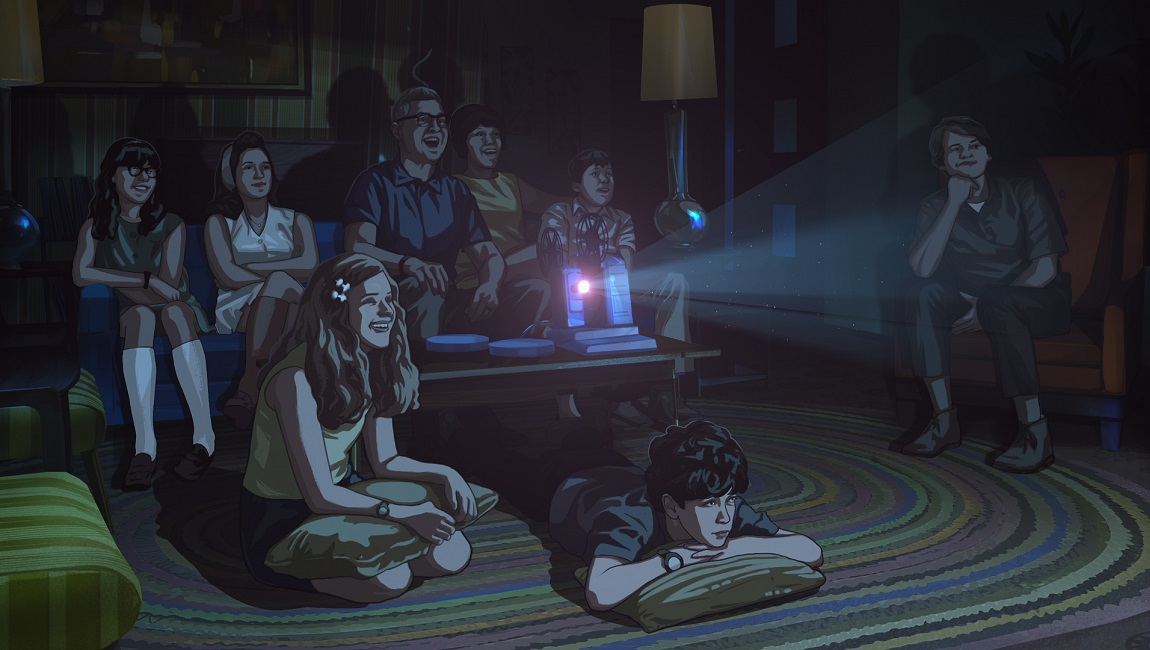Apollo 10 ½ is another wonderful work of melancholic yesteryear from cinema’s foremost purveyor of childhood nostalgia.
Apollo 10 ½: A Space Age Childhood finds writer-director Richard Linklater returning to the arena of rotoscoping — which, for the unaware, involves animators tracing over live-action footage frame by frame — a filmmaking technique utilized in the director’s 2001 effort Waking Life and again in 2006’s A Scanner Darkly. On its surface, though, Apollo 10 ½ appears to have little in common with these titles, as Linklater uses the 1969 Apollo moon landing to take a lean into the sense of childhood nostalgia that fueled such major efforts as Dazed & Confused and Boyhood. But Apollo 10 ½ takes a more fantastical approach to its thematic leanings than these precedents, its events situated very much in the real world yet focusing on a moment where impossibilities became realities, briefly uniting individuals around the globe in shared wonder that no dream was entirely out of reach. That it has taken Linklater this long in his career to tell this particular story proves the biggest mystery, as it’s not only loosely based on his own childhood under the shadow of NASA in 1960s Texas, but is as obvious a metaphor as any for the trials and tribulations of growing up, where an unwritten future is as mystifying as it is hopeful.
Our protagonist, Stan (Milo Coy), is ten-years-old and simply trying to navigate the everyday challenges that accompany life in his small Houston suburb in the summer of 1969. A “fabulist” by nature, Stan lives in a new subdivision with his stay-at-home mom (Lee Eddy), NASA-employed father (Bill Wise) — manager of Shipping and Receiving, which disappoints the adventure-prone lad — and five older brothers and sisters, all of whom share a relationship that is most surprising in its lack of contention. Jack Black narrates the proceedings as the grown-up version of Stan, who recounts formative events with equal parts wistfulness and bemusement, inspiring comparisons to The Wonder Years that are not entirely off-base. Stan’s remarkably unremarkable upbringing gets a jolt of adrenaline when two NASA officials (Zachary Levi and Glen Powell) show up at his school one day, insisting he is needed for a top-secret mission that will result in him being the first individual to walk on the moon, the result of a mathematical snafu in which those wacky NASA engineers made the lunar module too small for an adult male. But where most filmmakers would seize on this as the focal point of their story, detailing the rigorous training and danger-courting implicit to sending a 10-year-old child into space, Linklater treats it as only a minor plot detail, holding as much weight as any other seemingly mundane event that makes up a child’s life as they approach the cusp of adolescence. Great attention is paid to everything from the unforeseen dangers of schoolyard games to the various forms of pop culture that shape Stan as he tries to make sense of a world where man is capable of flying into space but also engaged in an endless war halfway around the globe. It’s in these details that Linklater excels, painting a portrait of a time and place whose specificity makes its themes resonate with bracing universality. Linklater captures the languorous days of board games, television shows, and various outdoor activities, where a trip to the movies can feel as exhilarating as a day at an amusement park, or how the real-life atrocities in the world at large can feel both simultaneously terrifyingly immediate and wholly remote, mere background noise to the more immediate concerns of The Monkees’ artistic integrity or rousing sessions of Red Rover.
As an allegory, Apollo 10 ½ is certainly heavy-handed, at one point threatening to topple over into the arena of parody as Linklater stacks metaphor atop metaphor, introducing a hilariously symbolic rollercoaster just as our young protagonist is about to take his first cautious steps onto the surface of the moon — we get it; growing up is both exhilarating and frightening, there will be a lot of ups and downs, etc. But the film is also a snapshot of a society on the brink of its own coming-of-age, an era of excitement and limitless possibility, seen in everything from the explosion of suburban construction to the creation of AstroTurf — you know, like grass, but better — to the space race itself. Each subsequent generation renews hope that the world can be a better place, with Apollo 10 ½ succinctly and affectingly bottling those fleeting feelings where that promise is at its most tangible. If we cannot all share in the feelings of melancholy that accompanied our favorite childhood Sunday-night television programs, where the specter of another Monday loomed large, the outlook is bleak. Linklater understands this better than most working filmmakers, and Apollo 10 ½ only further marks his mettle.
You can stream Richard Linklater’s Apollo 10 ½ on Netflix beginning on April 1.







